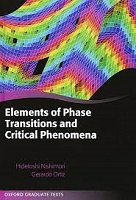Elements of Phase Transitions and Critical Phenomena
Author(s)
Nishimori, Hidetoshi
Ortiz, Gerardo
Language
EnglishAbstract
Phase transitions and critical phenomena have consistently been among the principal subjects of active studies in statistical physics. The simple act of transforming one state of matter or phase into another, for instance by changing the temperature, has always captivated the curious mind. This book provides an introductory account on the theory of phase transitions and critical phenomena, a subject now recognized to be indispensable for students and researchers from many fields of physics and related disciplines. The first five chapters are very basic and quintessential, and cover standard topics such as mean-field theories, the renormalization group and scaling, universality, and statistical field theory methods. The remaining chapters develop more advanced concepts, including conformal field theory, the Kosterlitz-Thouless transition, the effects of randomness, percolation, exactly solvable models, series expansions, duality transformations, and numerical techniques. Moreover, a comprehensive series of appendices expand and clarify several issues not developed in the main text. The important role played by symmetry and topology in understanding the competition between phases and the resulting emergent collective behaviour, giving rise to rigidity and soft elementary excitations, is stressed throughout the book. Serious attempts have been directed toward a self-contained modular approach so that the reader does not have to refer to other sources for supplementary information. Accordingly, most of the concepts and calculations are described in detail, sometimes with additional/auxiliary descriptions given in appendices and exercises. The latter are presented as the topics develop with solutions found at the end of the book, thus giving the text a self-learning character.


 Download
Download Web Shop
Web Shop